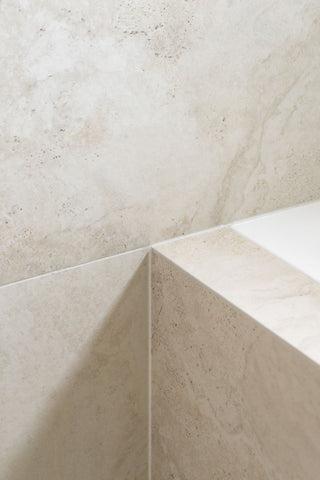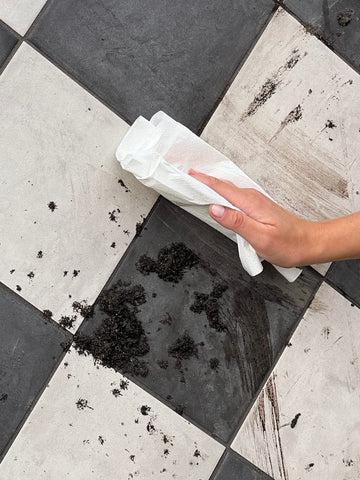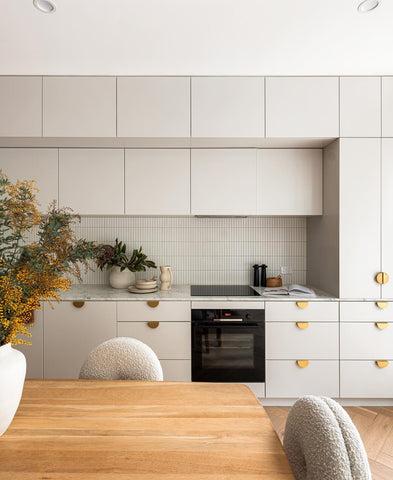Easy Clean-Up: Tiles Resistant to Stains and Spills
Life happens. And when it does, it often involves spills, splashes and the occasional art project gone awry. Whether it's a tipped-over glass of red wine, a culinary experiment that didn't quite go as planned or a toddler's enthusiastic approach to painting, our floors bear the brunt of our daily lives. But what if clean-up could be, well, a breeze? This is where stain and spill-resistant tiles come in. The right tiles can make your life a whole lot easier — and we’re here to tell you how to pick them.
The Science Behind the Spills
At a microscopic level, every surface has pores. These tiny openings determine how absorbent a material is. The more porous a surface, the more likely it is to soak up liquids, leading to potential stains. This is why certain tiles, like unglazed ceramics, might not be the best choice for areas prone to spills. In contrast, tiles like glazed ceramic and porcelain have a denser structure. This makes them less porous, reducing their likelihood of absorbing liquids and, as a result, resisting stains more effectively.

The Culprits: Common Household Spills
Every home has its list of usual suspects when it comes to spills. From vibrant beetroot juices that threaten to leave a lasting mark to the stubborn curry splatters that just refuse to budge, our floors and splashbacks see it all. And let's not forget the craft supplies — glitter, paint and glue, which have a knack for finding their way into the most inconvenient places. While these incidents are part and parcel of a lively home, they don't have to be a cleaning nightmare.
Choosing Your Tile: The First Line of Defence
The key to an easy clean-up lies in the initial choice of tiles. Not all tiles are created equal, especially when it comes to resisting stains and spills. Here's what to look for:
Porosity Matters: The less porous a tile, the less likely it is to absorb spills. Porcelain tiles, for instance, are known for their low porosity, making them great at resisting those accidental spills.
Glazed Over: Glazed ceramic tiles come with a protective layer that acts as a barrier against stains. This means that even if you're a tad late to the clean-up, you won't be left with a lasting reminder of that spill.
The Clean-Up Chronicles: Making Spills Disappear

Spills are bound to happen, especially in a bustling household. But with the right approach, these mishaps don't have to leave a lasting mark on your beautiful tiles.
Immediate Action is Key
It's a simple rule of thumb - the faster you attend to a spill, the easier it is to clean. When liquids sit on tiles for extended periods, they can seep into any unsealed grout lines or tiny pores, making them harder to remove. So, always have a cloth or paper towel handy, especially in high-risk spill areas like the kitchen or dining room.
Mild Detergents to the Rescue
No two spills are the same — there are so many variables that can make them either simple or tricky to clean. While water or clear liquids might be easy to tackle, oil-based or coloured liquids can be more stubborn. In such cases, a gentle detergent mixed with warm water can work wonders. The trick is to blot the spill rather than rub it, to prevent it from spreading. PSA: always remember to rinse the area with plain water after cleaning to remove any detergent residue.
Avoiding Harsh Chemicals
It might be tempting to use strong cleaning agents, especially for stubborn stains. However, these can erode the tile's protective finish over time, making them more susceptible to future stains. Instead, opt for pH-balanced cleaners or natural alternatives like a vinegar-water solution.
Seal the Deal with Grout
Grout, the material that fills the gaps between tiles, is porous. This means it can absorb spills, leading to unsightly stains. Darker grouts can hide stains better, but they might not always fit with your design vision. On the other hand, lighter grouts, while aesthetically pleasing, can show stains more readily. To stop that dreaded seepage, make sure your grout is sealed properly. A good quality grout sealer acts as a protective barrier, preventing spills from penetrating and making clean-up a breeze. If you notice your grout darkening or some discolouration over time, it might be time for a reseal.
The Magic of Microfiber
For daily cleaning, consider using a microfiber mop or cloth. These are designed to trap dirt, dust and spills, giving you a thorough clean sans chemicals. Plus, they're gentle on your tiles, preventing scratches or wear.
The beauty of tiles lies not just in their appearance but also in their ease of maintenance. With a proactive approach to spills and a gentle cleaning routine, your tiles from TileCloud will continue to shine and impress for years to come.
A World of Choices

The world of tiles is full of variety, which means you’re bound to find something that suits your design vision and lifestyle needs. As you now know, keeping your tiles stain-free is a cinch — all you need is a non-porous foundation, properly sealed grout and a gentle cleaning routine. Opting for tiles means you can spend less time stressing about spills and more time on what’s important: making memories.
The TileCloud Advantage: Making Life Simpler
At TileCloud, we understand the dynamics of a busy, lived-in home. That's why our range of tiles is not just about aesthetics; it's about practicality too. From kitchens that see culinary experiments to playrooms that bear the brunt of enthusiastic art projects, we have a tile for every scenario. And with our expert team on hand to guide you, choosing the perfect tile has never been easier.

Layla is a creative at heart, with an Advanced Diploma in Interior Design and being the Senior Marketing and Ecommerce Coordinator here at TileCloud she has a passion for staying up to date with the latest trends within the industry. Known for going down a rabbit hole on Pinterest and being a sucker for a good mood board to kick off any project.
